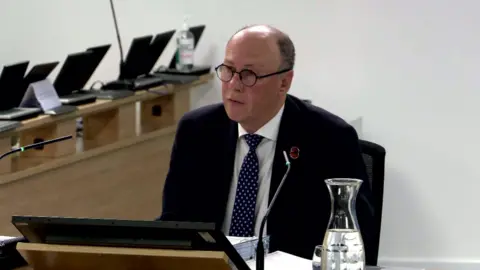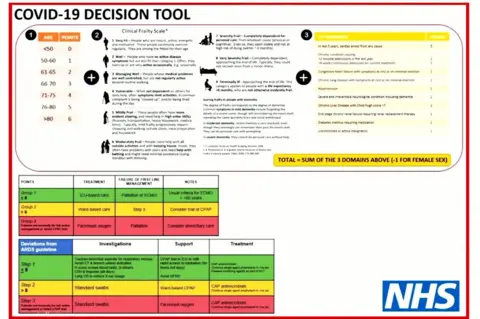 Covid Inquiry
Covid InquiryThe most senior doctor in England's NHS has said he is "personally terrified" that hospitals could be overwhelmed in the early stages of the pandemic.
Professor Sir Stephen Powis told the Covid inquiry officials have produced a draft document advising on whose care should be prioritized if the NHS finds itself unable to cope with a surge in patients.
The ‘Covid-19 Decision Tool’ scores patients based on their age, frailty and underlying conditions. High scores mean they may not be admitted to intensive care if services are overwhelmed.
After it became clear that infections may have peaked in March 2020, the tool was never released publicly.
Sir Stephen, who remains NHS England's national medical director, said senior clinicians who were asked to draw up a plan at short notice "did a brilliant job" and "no one else was willing to do it".
"But I am very aware that this will be controversial and there will be no opportunity for wider discussion with patient groups or the public," he added.
The draft document recommends doctors use a frailty scale to score COVID-19 patients based on three criteria.
It details that those with a total score of more than eight should not be admitted to intensive care if services are overwhelmed.
Patients aged 70 to 75 will automatically receive 4 points, while patients over 80 will receive 6 points.
Bonus points will be given for chronic conditions such as heart disease or diabetes.
People who are terminally ill and have a life expectancy of less than six months will automatically receive nine points.
 Covid Inquiry
Covid InquirySir Stephen said work on the guidance began at the start of the outbreak, when the number of patients in intensive care units in England was doubling every five to seven days.
"It was unclear whether the public would respond to the lockdown - which they did well - but it wasn't clear (at the time)," he said.
"Frankly, I'm personally terrified that the NHS will be overwhelmed."
The project was stopped on March 28, 2020, as it became clear that the peak of the first wave of COVID-19 was approaching and health services would not be "stretched beyond capacity".
Sir Stephen said there was also a danger that the scoring system could be used "inappropriately", replacing doctors' personal clinical judgement.
He added: "My recommendation to the inquiry is that we should absolutely not try to develop one of these tools during a pandemic in the future."
He said it was a job that would require consultation with the public "under normal circumstances".
"In my opinion, this is a discussion that should not be led by the government, or even by professionals, it needs to be within society."
